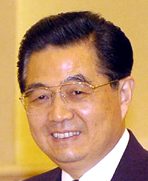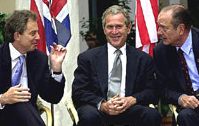|
CHINA
UNVEILS PLAN FOR CLIMATE CHANGE
China has unveiled its first national plan for climate
change, saying it is intent on tackling the problem but
not at the expense of economic development.
The
62-page report reiterated China's aim to reduce energy use
by a fifth before 2010 and increase the amount of
renewable energy it produces. But
it also repeated Beijing's view that responsibility for
climate change rests with rich westernised countries.

Hu
Jintao - Chinese President
The
report comes ahead of a G8 meeting that will focus on
global warming.
Germany,
which is hosting the meeting of industrialised nations, is
calling for a new UN protocol on climate change to replace
the Kyoto pact when it expires in 2012.
China's
role in the debate is crucial, as many analysts believe it
could overtake the US this year as the world's largest
emitter of greenhouse gases.
'Trailblazer'
China's
new national plan on climate change offered few new
targets on reducing greenhouse gas emissions, but outlined
how it intended to meet the goals it has already set,
analysts say. This
includes the use of more wind, nuclear and hydro power as
well as making coal-fired plants more efficient, the
document outlined.
But
it also stressed that the country's first priority
remained "sustainable development and poverty
eradication". "China is a developing country.
Although we do not have the obligation to cut emissions,
it does not mean we do not want to shoulder our share of
responsibilities," Ma Kai, chairman of China's
National Development and Reform Commission, said. "We
must reconcile the need for development with the need for
environmental protection," he said, adding that China
wanted to "blaze a new path to industrialisation".
He
said rich countries were responsible for most of the
greenhouse gases produced over the past century, and had
an "unshirkable responsibility" to do more to
tackle the problem.
"The
international community should respect the developing
countries' right to develop," he added.
The
plan is a strong declaration of intentions, but so far
China has missed almost every environmental target it has
set itself, the BBC's Quentin Sommerville in Shanghai
says.
Political
debate
Climate
change is expected to be fiercely debated when China's
President Hu Jintao and other industrialised leaders meet
in Germany for the G8 on Wednesday. UN Secretary-General
Ban Ki-moon has urged them to agree firm targets for
cutting polluting emissions.
In
a BBC interview, he said it was now up to the richest
countries to show leadership on the issue. "It will
be tragic if we don't take any action," he said.
"My main message is that to galvanise this political
will at the leaders level so that we can take necessary
action."
The
UN secretary-general has made tackling climate change one
of his top priorities, and called for a meeting of world
leaders on the subject in September.
He
wants the UN to be in the lead when it comes to agreeing
what should replace the Kyoto Protocol, the current
agreement curbing greenhouse gases, when it expires in
2012.
US
President George W Bush - whose country is the only
industrialised nation apart from Australia not to ratify
the protocol - has proposed uniting a group of big
emitters who would set non-binding targets by the end of
next year. But some analysts say this has been interpreted
as a way of undercutting other initiatives - for example
by the G8 or United Nations.
HINA'S
EMISSIONS
Between
1994 and 2004, China's greenhouse gas emissions grew
by 4% a year
China
currently depends on coal to meet two-thirds of its
energy needs
It
hopes to raise its use of renewable energy from 7% to
10% by 2010
China
may overtake the US as the world's largest emitter of
greenhouse gases by the end of this year
Leaders
of G8 countries aim to:
Boost
cooperation over trade and finance
Strengthen
the global economy
Promote
peace and democracy
Prevent
and resolve conflicts

Nelson
Kruschandl - "Well done on famine relief -
what
about global warming?"
OVERVIEW
The
G8's roots lie in the oil crisis and global economic
recession of the early 1970s. In 1973, these challenges
prompted the US to form the Library Group - an informal
gathering of senior financial officials from Europe,
Japan and the US.
At
the instigation of the French, the 1975 meeting drew in
heads of government. The delegates agreed to meet
annually. The six nations involved became known as the
G6, and later the G7 and G8 after the respective entries
of Canada (1976) and Russia (1998).
Initially
set up as a forum for economic and trade matters,
politics crept onto the G7 agenda in the late 1970s.
Issues under consideration at recent summits have
included helping the developing world, global security,
Middle East peace and Iraq reconstruction.
G8
members can agree on policies and can set objectives,
but compliance with these is entirely voluntary. The G8
has clout in other world bodies by virtue of the
economic and political muscle of its members.
The
workings of the G8 are a far cry from the "fireside
chats" of the Library Group in the 1970s. Holed up
behind fortress-like security, the delegates are
accompanied by an army of officials. Elaborate
preparations are made for their meetings, statements and
photo-calls.
Nevertheless,
G8 leaders strive to keep at least some of their
encounters free from bureaucracy and ceremony. On the
second day of their summit the leaders gather for an
informal retreat, where they can talk without being
encumbered by officials or the media.
The
European Union is represented at the G8 by the president
of the European Commission and by the leader of the
country that holds the EU presidency. The EU does not
take part in G8 political discussions.

Tony
Blair, George Bush and Jacques Chirac 2005
FACTS
-
Founded:
1975, Rambouillet, France
-
Original
members: France, Germany, Italy, Japan, UK, US
-
Later
members: Canada (joined at 1976 summit, San
Juan, Puerto Rico), Russia (joined at 1998 summit,
Birmingham, UK)
LEADERS
The
presidency of the G8 rotates between the group's member
nations on an annual basis.
The country holding the presidency in a given year is
also responsible for hosting the annual summit, and for
handling the security arrangements. As the
foremost economic and political power in the G8, the US
is regarded as the dominant member of the group,
although this position is not formally enshrined.
ISSUES
Critics
of the G8 have accused the body of representing the
interests of an elite group of industrialised nations,
to the detriment of the needs of the wider world.
Key countries with fast-growing economies and large
populations, including China and India, are not
represented. There are no African or Latin American
members. The G8's positive stance on globalisation
has provoked a vigorous response from opponents, and
riots have sometimes overshadowed summit agendas, most
notably in Italy in 2001.
The
violence has encouraged a tightening of the security
cordon that separates protesters and politicians,
reinforcing the G8's closed-door image. In recent
years the G8 has launched drives to counter disease,
including HIV-Aids, and has announced development
programmes and debt-relief schemes. But aid is often
dependent on the respect for democracy and good
governance in the recipient countries. Critics say that
spending on such initiatives is inadequate.
Basic
disagreements sometimes emerge within the G8: Global
warming was a sticking point at the 2001 Genoa summit,
where US President George W Bush underlined his
rejection of the Kyoto treaty on emissions. Rifts among
G8 members have also been evident over the US-led war in
Iraq.
Background
| The
summit agenda | Venue
| Participants
| Local
Impact
Local
Security
| Insurance
Cover | Business
Opportunities | Glossary
Publications
| Africa
| Climate
Change | Frequently
Asked Questions
What
is the G8 Summit?
| About
G8 Tartan
The
G8 leaders
2001:
Italy (Genoa summit)
2002:
Canada (Kananaskis summit)
2003:
France (Evian summit)
2004:
US (Sea Island summit)
2005:
UK (Gleneagles summit)
Global
Warming
| Waste
Recycling | Climate
Change
MORE
ON AGENDA 21
MEMBERS
OF PARLIAMENT A-Z HOUSE
OF LORDS A-Z COUNCIL'S
AGENDA 21
BBC
Links
Aminata's
hopes
A
delegate at the youth equivalent of G8 shares her
thoughts

Africa
Links
Climate Change Links
Other G8 Summit websites
Britain and Scotland
UK Government
Youth events in 2005
linked to key G8 themes of Africa and Climate Change
Additional Links

Healthier
alternative tastes for adventure capitalists

Solar
Red | Solar
Crush + | Solar
Cola | Solar
Citrus + | Solar
+
|